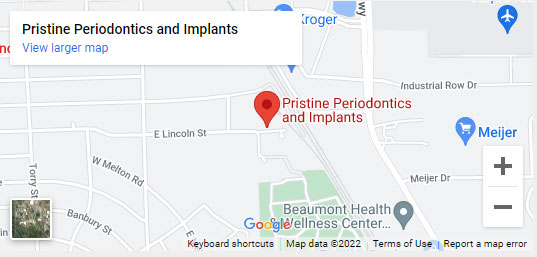
Weight Fluctuations: The Impact on Dental Implants
Dental implants are artificial tooth roots placed surgically in the jawbone to replace missing teeth. Implants provide a strong, permanent foundation for fixed replacement teeth. With proper care, implants can last for many years. However, significant weight loss can potentially impact dental implants. Our Birmingham, MI, implant dentist, Dr. Abdullah Sayed, explains how weight loss before and after implant surgery may affect the implants.
How Weight Loss Can Affect Implant Surgery
Being overweight makes the implant surgery process more difficult for both the surgeon and the patient. Excess fat in the mouth and neck can interfere with proper positioning and ideal placement of the implants. Losing weight before surgery through proper diet and exercise can help make the procedure easier and reduce risks.
Excess weight also increases general surgical risks such as infection, poor healing, and anesthesia complications. However, losing weight improves overall health and brings the patient’s weight within a safe range for surgery. This reduces the chance of dangerous surgical complications.


Importance of Nutrition After Implants
Proper nutrition is crucial after receiving dental implants to help preserve bone mass and stabilize implants. Here are the nutrients you should consider:
- Adequate protein intake helps maintain muscle and bone density during weight loss.
- Calcium and vitamin D are also crucial for maintaining jawbone health around implants.
- Zinc is a mineral that supports bone mineralization and healing, so zinc-rich foods or multivitamins with zinc can help protect implants.
Consulting with a doctor or nutritionist can help determine optimal amounts of these protective nutrients while achieving weight loss goals.
How Weight Loss Can Affect Implants After Surgery
Bone loss is a common side effect of significant weight loss. Since dental implants are secured in the jawbone, bone loss from weight loss can cause implants to become loose or fail. The forces generated by biting and chewing can be too much for implants in weakened bones.
Significant weight loss also alters the forces placed on the implants. Changes in the bite and force distribution due to weight loss can progressively affect the stability of implants over time. In some cases, bone grafts or new implants may be necessary after dramatic weight loss.


Exercising Caution with Rapid Weight Loss
Very low-calorie diets promote rapid weight loss but pose risks to dental implants. Rapid weight loss increases the stress placed on implants and is more likely to result in bone loss around implants. This makes implants vulnerable to becoming unstable or failing altogether. Slow, gradual weight loss is ideal for protecting implants.
Protecting Implants During Weight Loss
Those looking to lose weight after receiving implants should take steps to protect implant stability.
- Losing weight slowly through modest calorie reduction is ideal. Severe dieting causes rapid weight loss.
- Consuming adequate protein, calcium, and vitamins helps preserve jawbone density.
- During the most extreme weight loss, using a removable partial denture or “flipper” can take pressure off implants.
- Scheduling regular dental checkups allows our Birmingham dentist to carefully monitor implants and intervene early if issues arise.
With proper precautions, dental implants can be well-maintained during weight loss.


Options if Implants Are Affected
If dental implants become compromised due to weight loss, there are several treatment options to consider:
- Bone Grafting — Additional bone material can be placed around the implant to re-establish stability and stimulate bone growth. This helps reinforce the implant.
- Implant Splinting — Adjacent implants can be joined together with a connector to provide mutual stability. This may help salvage loose implants.
- Implant Replacement — Failed or unstable implants may need to be completely removed and replaced with new implants.
- Restoration Adjustment — If the crown or bridge on the implant is now ill-fitting, the restoration can be adjusted or remade to account for changes.
- Temporary Prosthetic — A removable partial denture may be recommended during implant healing and bone regeneration.
- Implant Removal — In some cases of extreme bone loss, implant removal without replacement may be suggested.
Consult thoroughly with your Birmingham implant provider to determine the best solution if your implants are failing or unstable due to weight loss. Proactive steps can often get your implants safely functioning again.
The Importance of Regular Dental Checkups
Regular dental checkups at our Birmingham, MI dental office are critical to monitor the health of your implants as your weight fluctuates. Biannual exams allow Dr. Sayed to check your implants and surrounding bone levels. Digital X-rays can also detect any loosening or changes in the bone. Early intervention can address any implant problems before complete failure occurs.

Frequently Asked Questions
Can I have dental implants if I’m overweight?
Ongoing health issues related to obesity, such as diabetes or high blood pressure, may also interfere with healing. Losing some weight before implant surgery is advisable to reduce risks. Discuss your options thoroughly with your dentist.
What if I lose weight rapidly due to illness — will this damage implants?
Will exercising more during weight loss help or hurt my implants?
I have loose skin after massive weight loss — can this impact implants?
Protecting Your Implants With Proper Weight Loss
Weight changes can significantly impact dental implants, so being proactive is important. If you are considering implants but are currently overweight, speak to your doctor about the right weight loss plan beforehand. To learn more about dental implants, contact Pristine Periodontics and Implants in Birmingham, MI, at (248) 838-1143 to schedule your consultation.
Our Birmingham dental practice is conveniently located near Pontiac and Highland Park, MI. Our Canton office is near Ann Arbor and Dearborn, MI. Discover how quick, easy, and painless getting implants can be. Renew your confidence with a brand-new, full smile!
Why Wait? Contact us today for information on your Dental Implant Consultation
Call Us Today! 248-838-1143


